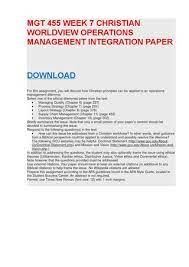-
Best Australian Pokies Best Payout
Play Free 777 Pokies Online
What Are the Best Australian Pokies to Win Big On
What Are the Best Online Pokies with Low Minimum Deposits for Real Money in Australia
New Australian Pokies Accepting PayID
What Are the Best Strategies to Win in Online Pokies with Bonus Rounds in Australia
Tips for Winning Top Australian Pokies
What Online Casinos Offer Free Play Pokies with Welcome Bonuses in Australia
Australian Slot Games
Payout Ratio Pokies with Welcome Bonus

Operations Management Christian Integration Paper. For this assignment, you will discuss how Christian principles can be applied to an operations management dilemma:
Operations Management Christian Integration Paper
For this assignment, you will discuss how Christian principles can be applied to an operations management dilemma:
First, begin by selecting one of the ethical dilemmas below from the text:
Managing Quality (Chapter 6)
Process Strategy (Chapter 7)
Layout Strategy (Chapter 9)
Supply Chain Management (Chapter 11)
Inventory Management (Chapter 12)
In a minimum of 1,500 words, discuss the following:
Briefly summarize the issue. Note that only a small portion of your paper’s content should be devoted to summarizing the issue.
Respond to the question(s) shown within your selected ethical dilemma (i.e., within the gold box). Please do not respond to the end-of-chapter Discussion Questions.
How can your selected dilemma be addressed from a Christian worldview? In other words, what guidance from a biblical perspective could be applied to understand and possibly resolve the dilemma? The following GCU website may be helpful: https://www.gcu.edu/about-gcu/christian-identity-and-heritage.php
In addition to addressing questions for item 3 above, you may also optionally frame the issue using ethical theories (utilitarianism, Kantian ethics, distributive justice, virtue ethics, and covenantal ethics). Note, however, that the questions in item 3 must still be addressed.
Your paper should have at least six external references (in additional to any biblical citations) to help frame the issue. Cite your references within the body of your paper. No Wikipedia references are allowed.
Submit your file in a Microsoft Word document. Ensure that your last name is in your file name.
Prepare this assignment according to the guidelines found in the APA Style Guide, located in the Student Success Center. An abstract is not required.
This assignment uses a rubric. Please review the rubric prior to beginning the assignment to become familiar with the expectations for successful completion..
The impact of supply chain integration on performance: A contingency and configuration approach
Attachments
